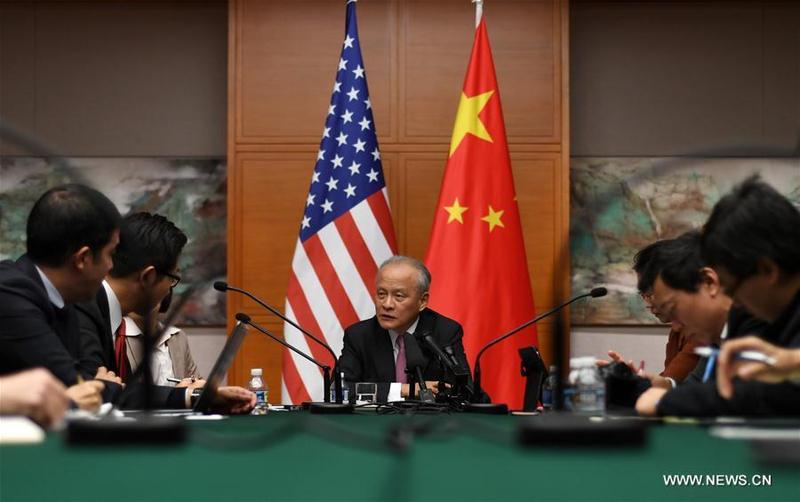Media Report

- The Washington Post reports: "China's ambassador on Mondaybrushed off the Trump administration's complaints that Beijing is employing predatory trade and economic practices to bully and intimidate neighbors, suggesting that the United States 'look in the mirror because they might be describing themselves.' Ambassador Cui Tiankai's comments during a briefing with reporters came as President Trump prepares to leave Washington at week's end for a 12-day swing through five Asian nations, including China, during which the main topics are expected to be confronting North Korea and discussions on U.S. trade relations in the region. Cui emphasized that Chinese President Xi Jinping, fresh off his consolidation of power at China's 19th Communist Party Congress, is preparing to welcome Trump with a lavish reception, including a military honor guard and formal banquet. The ambassador said the aim is to honor Trump on his first visit to China since taking office with a "state visit-plus" that aims to replicate Trump's two-day summit with Xi at Mar-a-Lago in south Florida in April."
- Reuters reports: "Seoul and Beijing on Tuesday agreed to move beyond a year-long stand-off over the deployment of a U.S. anti-missile system in South Korea, a dispute that has been devastating to South Korean businesses that rely on Chinese consumers. The unexpected detente comes just days before U.S. President Donald Trump begins a trip to Asia, where the North Korean nuclear crisis will take center stage, and helped propel South Korean stocks to a record high. The installation of the U.S. Terminal High Altitude Area Defense (THAAD) system had angered China, with South Korea's tourism, cosmetics and entertainment industries bearing the brunt of a Chinese backlash, although Beijing has never specifically linked that to the THAAD deployment. Beijing worries the THAAD system's powerful radar can penetrate into Chinese territory... Before the THAAD dispute, bilateral relations flourished, despite Beijing's historic alliance with North Korea and Seoul's close ties with Washington, which includes hosting 28,500 U.S. troops. China is South Korea's biggest trading partner."
- The Wall Street Journal comments: "Communist systems show no mercy to political losers. Liu Shaoqi, one of Mao's designated successors, died on a prison floor in his own filth. Another, Lin Biao, perished in a plane crash fleeing China. Power transfers are how one-party systems threaten to come unstuck. High-level battles roiled Deng Xiaoping's reign too. The urbane Zhao Ziyang, ousted as Communist Party chief for encouraging pro-democracy protesters in Tiananmen Square in 1989, spent the rest of his days under virtual house arrest in Beijing. Eventually, Deng hit on an alternative to winner-take-all contests: collective leadership, along with term limits. The party got a new lease on life. Deng's signal innovation allowed China to focus its energies on getting rich. By abandoning the first part of Deng's formula, and calling into question the second, Xi Jinping has pitched Chinese elite politics into a potentially precarious unknown. For the first time in several decades, the succession question is up in the air; the just-concluded 19th Party Congress failed to appoint a next-in-line to Mr. Xi. Will he stay on as leader-for-life? Nobody can say, although now that his 'thought' is embedded in the party charter alongside Mao's he is politically untouchable."
Calendar
- 2017-10-30 Chinese stocks are selling off after a week of steady trade during China's Party Congress
- 2017-10-29 China angered over US aluminum foil anti-dumping duties
- 2017-10-27 China's graft tsar draws remarkable political career to close
- 2017-10-26 China is the largest market for robots in the world right now, ABB CEO says
- 2017-10-25 These Seven Men Now Run China
- 2017-10-24 Trump to press China on North Korea, trade on Beijing visit
- 2017-10-23 China’s Pursuit of Fugitive Businessman Guo Wengui Kicks Off Manhattan Caper Worthy of Spy Thriller
- 2017-10-22 China Says Jobless Rate Lowest in Years, but Challenges Persist
- 2017-10-20 What We Learned on Day Three of China’s Party Congress
- 2017-10-19 What We Learned on Day Two of China's Communist Party Congress
News
- Reuters China, South Korea agree to mend ties after THAAD standoff
- The Washington Post Chinese ambassador responds to Trump's trade complaints: 'Look in the mirror'
- Bloomberg Moon Seeks Detente With China, North Korea Before Trump Visit
- CNBC China is said to have practiced bombing attacks against Guam
- Reuters China warns against attempts to contain Beijing before Trump visit
- Quartz Seven reasons why Chinese-made Hindu gods rule Indian markets
- Wired China Tests the Limits of its Hacking Truce
- Financial Times China to take centre stage at Bonn climate talks amid vacuum left by Trump
- Reuters China considers three-year jail terms for disrespecting national anthem, flag
- CNBC China's manufacturing activity was worse than expected in October
- Bloomberg Another China Company Defaults on Bond Payment as Borrowing Costs Jump
- CNBC Asian shares close mixed following Wall Street losses; China data falls short
- Business Insider Shares jump after China backs down from protesting South Korean companies over US missile defense deployment
Commentary
- The Wall Street Journal China's Dangerous Return to One-Man Reign
- Quartz An idiom uttered by Xi Jinping perfectly describes Mark Zuckerberg's frustrating China courtship
- Forbes Pollution And Climate Change Are Critical Tests For China's Ambitions As A Global Leader
- The National Interest America Is Finally Punishing China over North Korea's Deadly Missile Launchers
- Newsweek How China Is Using Quantum Physics to Take Over the World and Stop Hackers
- Forbes Why China Never Draws A Boundary Line Around Its Claim To The South China Sea
- American Thinker Chinese Active in Cuba
